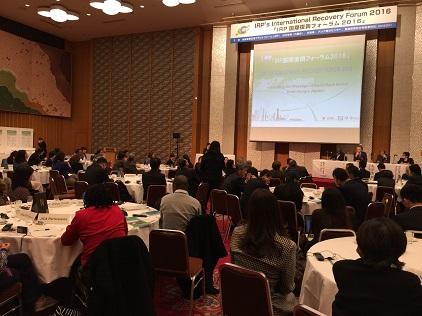 |
| The annual International Recovery Forum took place in Kobe, Japan |
The Sendai Framework, adopted by UN member States in March 2015, as a blueprint for reducing disaster losses places special emphasis on ensuring that capacities are in place for effective recovery.
In January, the annual International Recovery Forum attracted 170 participants from 37 countries to Kobe, Japan, and much of the discussion centred around Priority Four of the Sendai Framework which notes that the recovery, rehabilitation and reconstruction phase is a “critical opportunity to ‘Build Back Better.’”
The Chair of International Recovery Platform (IRP) Steering Committee, Mr. Stefan Kohler said in his opening remarks: “After a decade of functioning as an international source of knowledge on good recovery practice, IRP is revitalized with recognition in the Sendai Framework and is now a leading international mechanism for sharing of practical approaches and learning among countries”.
The IRP has endorsed a Strategic Framework 2016-2020 which sees a shift from functioning as an international source of knowledge on good recovery practice to a specialized role as an international mechanism for sharing experienced and lessons associated with Build Back Better.
The participating countries in the International Recovery Forum were joined by representatives from international and regional organizations, NGOs, and academic institutions who shared their experiences in disaster recovery and reconstruction. A number to case studies described were presented.
The Program Coordinator from Coordination Center for the Prevention of Natural Disasters in Central America (CEPREDENAC), Ms. Mayra Gisela Valle Torres shared the challenges faced in the recent landslides in Central America.
Landslides were among the world’s 10 deadliest disasters in 2015 and claimed the lives of 627 people in Guatemala in October. In the post-disaster phase, Ms. Torres identified the challenges as non-compliance with good urban planning and building codes and the difficulty of establishing property ownership after residents had evacuated their homes. These contributed to delays in the recovery process. From these lessons learned, she highlighted the importance of a multi-sectoral approach to the recovery process and the involvement of local government.
The Principle Mitigation Officer from the Department of Disaster Management Affairs (DoMA) in Malawi, Mr. Stern Kita, said that a key lesson learned from the 2015 floods which killed 278 people and affected 3.4 million, was that the recovery is not only about rebuilding the infrastructure and housing but it is also about rebuilding people’s livelihoods.
He said that rebuilding the agriculture sector was one of the major challenges after the flood last year. With this experience, he emphasized the importance of addressing risk and human vulnerability and thinking beyond just physical infrastructure in order to build back better.
Mr. Neil McFarlane, UNISDR Regional Coordinator, said that IRP will play an important role in advising on the progress and challenges in the implementation of the “Build Back Better” priority of the Sendai Framework.
The International Recovery Forum is an annual event hosted by the Hyogo Prefecture and supported by the Government of Japan to build cooperation, provide guidance and discuss major recovery and reconstruction issues as part of disaster risk reduction.